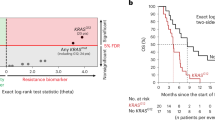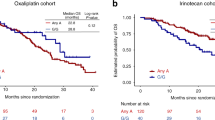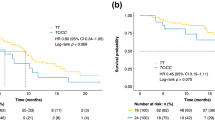Abstract
The identification of clinical and genetic parameters to predict the outcome in advanced colorectal cancer is a key issue in the management of this disease. We ascertained whether the clinical determinants of survival defined in a large cohort of patients treated with 5-fluorouracil (5-FU) (European Organization for the Research and Treatment of Cancer, EORTC model) also apply to 109 colorectal cancer patients receiving a therapy including oxaliplatin/5-FU as their first-line treatment. Our results confirm the considerable discriminatory power of the clinical model proposed in patients treated with a combined chemotherapy regimen. With the aim of identifying additional genetic prognostic parameters, we determined whether the polymorphisms in the promoter region of the thymidylate synthase (TS) gene that modifies the number of operative binding sites of a transcription factor (USF) could predict the clinical outcome of our patients and complement the EORTC clinical model. Our results indicate that this new genetic parameter (the number of USF-binding sites) could be considered when evaluating the role of TS genotype in the efficacy of the 5-FU-based regimens. Further, confirmatory studies aimed at evaluating the effect of the number of binding sites of transcription factors for selecting 5-FU-treated patients are warranted.
This is a preview of subscription content, access via your institution
Access options
Subscribe to this journal
Receive 6 print issues and online access
$259.00 per year
only $43.17 per issue
Buy this article
- Purchase on Springer Link
- Instant access to full article PDF
Prices may be subject to local taxes which are calculated during checkout

Similar content being viewed by others
References
Grem JL . 5-Fluorouracil: forty-plus and still ticking. A review of its preclinical and clinical development. Invest New Drug 2000; 18: 299–313.
Rothenberg ML, Oza AM, Bigelow RH, Berlin JD, Marshall JL, Ramanathan RK et al. Superiority of oxaliplatin and fluorouracil–leucovorin compared with either therapy alone in patients with progressive colorectal cancer after irinotecan and fluorouracil–leucovorin: interim results of a phase III trial. J Clin Oncol 2003; 21: 2059–2069.
Danenberg PV . Thymidylate synthetase: a target enzyme in cancer chemotherapy. Biochim Biophys Acta 1977; 473: 73–92.
Longley DB, Harkin DP, Johnston PG . 5-Fluorouracil: mechanisms of action and clinical strategies. Nat Rev Cancer 2003; 3: 330–338.
Köhne CH, Cunningham D, Di Costanzo F, Glimelius B, Blijham G, Aranda E et al. Clinical determinants of survival in patients with 5-fluorouracil-based treatment for metastatic colorectal cancer: results of a multivariate analysis of 3825 patients. Ann Oncol 2002; 13: 308–317.
Pullarkat ST, Stoehlmacher J, Ghaderi V, Xiong YP, Ingles SA, Sherrod A et al. Thymidylate synthase gene polymorphism determines response and toxicity of 5-FU chemotherapy. Pharmacogenomics J 2001; 1: 65–70.
Villafranca E, Okruzhnov Y, Dominguez MA, Garcia-Foncillas J, Azinovic I, Martinez E et al. Polymorphisms of the repeated sequences in the enhancer region of the thymidylate synthase gene promoter may predict downstaging after preoperative chemoradiation in rectal cancer. J Clin Oncol 2001; 19: 1779–1786.
Marsh S, McKay JA, Cassidy J, McLeod HL . Polymorphism in the thymidylate synthase promoter enhancer region in colorectal cancer. Int J Oncol 2001; 19: 383–386.
Marcuello E, Altés A, Del Rio E, Cesar A, Menoyo A, Baiget M . Single nucleotide polymorphism in the 3′ tandem repeat sequences of thymidylate synthase gene predicts for response to fluorouracil-based chemotherapy in advanced colorectal cancer patients. Int J Cancer 2004; 112: 733–737.
Cohen V, Panet-Raymond V, Sabbaghian N, Morin I, Batist G, Rozen R . Methylenetetrahydrofolate reductase polymorphism in advanced colorectal cancer: a novel genomic predictor of clinical response to fluoropyrimidine-based chemotherapy. Clin Cancer Res 2003; 9: 1611–1615.
Etienne MC, Formento JL, Chazal M, Francoual M, Magne N, Formento P et al. Methylenetetrahydrofolate reductase gene polymorphisms and response to fluorouracil-based treatment in advanced colorectal cancer patients. Pharmacogenetics 2004; 14: 785–792.
Jakobsen A, Nielsen JN, Gyldenkerne N, Lindeberg J . Thymidylate synthase and methylenetetrahydrofolate reductase gene polymorphism in normal tissue as predictors of fluorouracil sensitivity. J Clin Oncol 2005; 23: 1365–1369.
Marcuello E, Altés A, Menoyo A, del Rio E, Baiget M . Methylenetetrahydrofolate reductase gene polymorphisms: genomic predictors of clinical response to fluoropyrimidine-based chemotherapy? Cancer Chemother Pharmacol 2006; 57: 835–840.
Van Kuilenburg AB, Meinsma R, Zoetekouw L, Van Gennip AH . High prevalence of the IVS14+1G>A mutation in the dihydropyrimidine dehydrogenase gene of patients with severe 5-fluorouracil-associated toxicity. Pharmacogenetics 2002; 12: 555–558.
Horie N, Aiba H, Oguro K, Hojo H, Takeishi K . Functional analysis and DNA polymorphism of the tandemly repeated sequences in the 5′-terminal regulatory region of the human gene for the thymidylate synthase. Cell Struct Funct 1995; 20: 191–197.
Kawakami K, Salonga D, Park JM, Danenberg KD, Uetake H, Brabender J et al. Different lengths of a polymorphic repeat sequence in the thymidylate synthase gene affect translational efficiency but not its gene expression. Clin Cancer Res 2001; 7: 4096–4101.
Kawakami K, Omura K, Kanehira E, Watanabe Y . Polymorphic tandem repeats in the thymidylate synthase gene is associated with its protein expression in human gastrointestinal cancers. Anticancer Res 1999; 19: 3249–3252.
Mandola MV, Stoehlmacher J, Muller-Weeks S, Cesarone G, Yu MC, Lenz HJ et al. A novel single nucleotide polymorphism within the 5′ tandem repeat polymorphism of the thymidylate synthase gene abolishes USF-1 binding and alters transcriptional activity. Cancer Res 2003; 63: 2898–2904.
Kawakami K, Watanabe G . Identification and functional analysis of single nucleotide polymorphism in the tandem repeat sequence of thymidylate synthase gene. Cancer Res 2003; 63: 6004–6007.
Gusella M, Bolzonella C, Crepaldi G, Ferrazzi E, Padrini R . A novel G/C single-nucleotide polymorphism in the double 28-bp repeat thymidylate synthase allele. Pharmacogenomics J 2006; 6: 421–424.
Ulrich C, Bigler J, Velicer C, Greene E, Farin F, Potter J . Searching expressed sequence tag databases: discovery and confirmation of a common polymorphism in the thymidylate synthase gene. Cancer Epidemiol Biomark Prev 2000; 9: 1381–1385.
Mandola MV, Stoehlmacher J, Zhang W, Groshen S, Yu MC, Iqbal S et al. A 6 bp polymorphism in the thymidylate synthase gene causes message instability and is associated with decreased intratumoral TS mRNA levels. Pharmacogenetics 2004; 14: 319–327.
Suh KW, Kim JH, Kim YB, Kim J, Jeong S . Thymidylate synthase gene polymorphism as a prognostic factor for colon cancer. J Gastrointest Surg 2005; 9: 336–342.
Brody JR, Hucl T, Gallmeier E, Winter JM, Kern SE, Murphy KM . Genomic copy number changes affecting the thymidylate synthase gene in cancer: a model for patient classification to aid fluoropyrimidine therapy. Cancer Res 2006; 66: 9369–9373.
Salgado J, Zabalegui N, Gil C, Monreal I, Rodriguez J, Garcia-Foncillas J . Polymorphisms in the thymidylate synthase and dihydropyrimidine dehydrogenase genes predict response and toxicity to capecitabine-raltitrexed in colorectal cancer. Oncol Rep 2007; 17: 325–328.
World Health Organization. Handbook for Reporting Results of Cancer Treatment.Publication no 48. World Health Organization: Geneva, Switzerland, 1979.
Miller SA, Dykes DD, Polesky H . A simple salting out procedure for extracting DNA from human nucleated cells. Nucleic Acids Res 1989; 16: 1215.
Dotor E, Cuatrecases M, Martinez-Iniesta M, Navarro M, Vilardell F, Guino E et al. Tumor thymidylate synthase 1494del6 genotype as a prognostic factor in colorectal cancer patients receiving fluorouracil-based adjuvant treatment. J Clin Oncol 2006; 24: 1603–1611.
Acknowledgements
This work was partially supported by the Fondo de Investigación Sanitaria (PI 05/1218).
Author information
Authors and Affiliations
Corresponding author
Additional information
Duality of interest
The authors declare no duality of interest.
Rights and permissions
About this article
Cite this article
Paré, L., Marcuello, E., Altés, A. et al. Transcription factor-binding sites in the thymidylate synthase gene: predictors of outcome in patients with metastatic colorectal cancer treated with 5-fluorouracil and oxaliplatin?. Pharmacogenomics J 8, 315–320 (2008). https://doi.org/10.1038/sj.tpj.6500469
Received:
Revised:
Accepted:
Published:
Issue Date:
DOI: https://doi.org/10.1038/sj.tpj.6500469
Keywords
This article is cited by
-
Thymidylate synthase germline polymorphisms in rectal cancer patients treated with neoadjuvant chemoradiotherapy based on 5-fluorouracil
Journal of Cancer Research and Clinical Oncology (2010)



